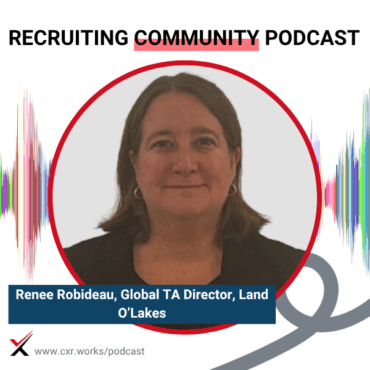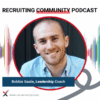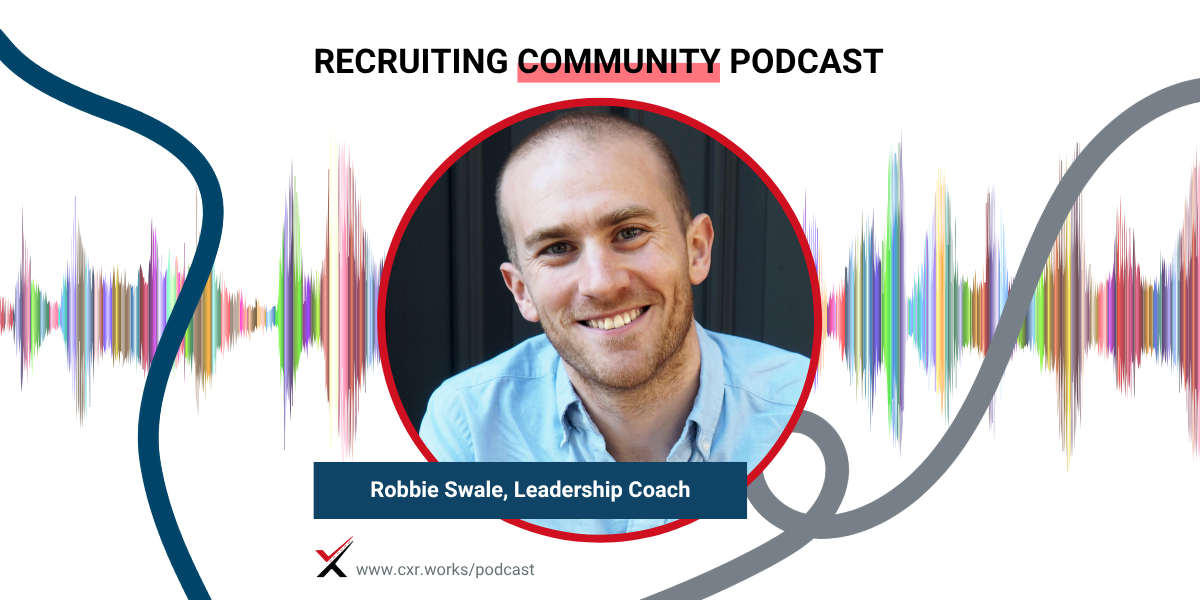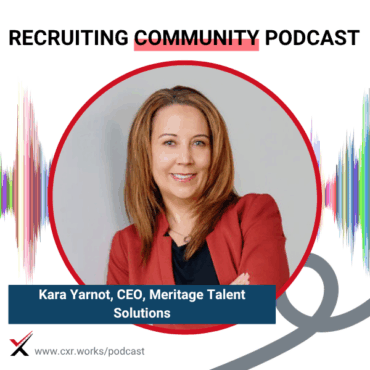
Navigating TA Leadership at Land O’Lakes
From dot-com busts to AI disruption, Renee Robideau shares how Land O’Lakes is building a resilient, strategic TA function—one business challenge at a time.
 play_arrow
play_arrow
Secrets of Meaningful Productivity Cami Grace
 play_arrow
play_arrow
From Sports Agent to TA Leader: Steve White’s Career Crossroads Cami Grace
 play_arrow
play_arrow
Navigating TA Leadership at Land O’Lakes Cami Grace
 play_arrow
play_arrow

Featured Guests:
Robbie Swale, Leadership Coach, Author, Podcaster
Hosts:
Chris Hoyt, President, CareerXroads
Episode Overview:
In this episode, Chris Hoyt speaks with Robbie Swale, a leadership coach and recent CXR Lecture Series speaker, about his framework for “meaningful productivity.” They discuss how modern leaders can better navigate complexity by shifting from traditional time management to managing attention, energy, and relationships. Robbie shares the origins of his six-pillar model and how small changes in mindset and behavior can help leaders thrive in today’s fast-paced work environment.
Key Topics:
Differences between traditional productivity and meaningful productivity
The six pillars of meaningful productivity: choice, attention, energy, attitude, relationship, and habit management
The limitations of time management in knowledge work
Common mindset traps and how to overcome them
Navigating workplace complexity and leadership challenges
Practical tactics to reclaim focus and reduce overwhelm
Notable Quotes:
“We confuse busyness with productivity. But meaningful productivity is about getting more of what really matters done.” — Robbie Swale
“Time is uncontrollable—we can’t manage it. What we can manage are our choices, our attention, and our energy.” — Robbie Swale
“You’re not failing; you’re making conscious trade-offs.” — Robbie Swale
“Relationship management often means having difficult conversations. But those are where meaningful work gets unlocked.” — Robbie Swale
“Most people aren’t getting everything done either. You’re not alone.” — Robbie Swale
Takeaways:
Robbie Swale’s framework for meaningful productivity offers a refreshing alternative to conventional time management. By focusing on what we can control—our choices, mindset, and relationships—leaders can reduce overwhelm and make progress on what truly matters. His practical insights and real-world examples provide a valuable guide for navigating today’s workplace complexity with clarity and purpose.
Want more conversations like this?
Subscribe to the CXR podcast and explore how top talent leaders are shaping the future of recruiting. Learn more about the CareerXroads community at cxr.works.
Chris Hoyt: Robbie, I’m really excited that you joined us, and we’ll get into a little bit of how we met and how we know you. You’re not in Austin—you’re obviously not sitting down the street. You’re not exactly local.
Robbie Swale: No, that’s right. I’m over here in the West Midlands of England, near Birmingham and also near Stratford-upon-Avon, which some people have visited because it’s where Shakespeare was born. So there are lots of Shakespeare tourists near me. It’s a long way away and a different time of day, but it’s great to be here.
Chris Hoyt: I think you said earlier, as we were getting ready, that we have to watch our volume levels. You’ve got a little bit of an active house, end of the day, little ones running around?
Robbie Swale: That’s exactly right. Don’t want to disturb them too much as they’re winding down. It’s a kind of crazy time for us because my wife started a new job a month or two ago, just as our older daughter, who’s now nearly five, started school. So it’s been a crazy term where none of us really know where we are or what we’re doing. I’ve changed my working hours because Emma’s now working full time again. It’s a very interesting time in this little corner of England.
Chris Hoyt: Oh man, I have to tell you—I have two daughters. They’re grown, adults, and off the payroll. It’s wonderful to have disposable income again. But every time someone says they’ve got a kid who’s five or eight, I have this emotional response of, “I remember that age, and it was such a wonderful age.” But I think I feel that way because I’m done with that age.
Robbie Swale: I do know it’s wonderful. We’ll have a moment—once they’re asleep and the house is beginning to tidy—where one of us will say, “Hey, you’ll never guess what one of them said today.” Today, I told my wife, Emma—so we’ve got Leah, who’s nearly five, and Gabriela, who’s two and a half. Gabriela really wanted to eat her evening snack, but I said no, she had to wait until we were all sitting down. She got upset. Later, I asked Leah, “Where’s your water bottle? Did I leave it in the car?” Leah said yes. A minute later, Gabriela says, “Daddy, I want you to go get Leah’s bottle from the car so I can eat my wrap.” She figured if I left the room, she could sneak it in!
We get that wonderful side of it. Anyone with kids that age will understand—it is an intense time. We might talk about complexity from a workplace point of view, but the level of things having to be managed by a family is huge. My wife’s mom has had some health problems this year, and there’s just a lot going on. It feels like a pressure valve or crunch point that we’re going through. My mom was saying to me, “Robbie, you’re nearly out of it.” She figured it was when I was about six and my sister was three that she stopped feeling mad all the time. Maybe we’re nearly out of it. We’ll see.
Chris Hoyt: I love that phrasing—“I feel a little less like I’m mad all the time.” Kids are great. They’re super direct and say funny little things that make you love them so much. The rest of the time, they’re like little lizard brains running around. But it’s fun to watch them connect the dots.
Robbie Swale: Yeah, and we might come back to that—because more often than we like to admit, we’re all little lizard brains running around. And when they’re tired or have eaten sweets, suddenly it’s a different creature you’re dealing with.
Chris Hoyt: I’ve been in meetings with hiring managers who were like little kids who didn’t get their treat or their nap. I’m sure a lot of people can identify with that.
Robbie Swale: For sure.
Chris Hoyt: Oh man. We’ve got a bunch to talk about. You ready to go?
Robbie Swale: I’m ready.
Chris Hoyt: All right. Here we go.
Announcer: Welcome to the Recruiting Community Podcast, the go-to channel for talent acquisition leaders and practitioners. This show is brought to you by CXR, a trusted community of thousands connecting the best minds in the industry to explore topics like attracting, engaging, and retaining top talent. Hosted by Chris Hoyt and Jerry Crispin, we are thrilled to have you join the conversation.
Chris Hoyt: Everybody, welcome to the Recruiting Community Podcast. I’m Chris Hoyt, president of CareerXroads, often hosting the show with Jerry Crispin, our co-founder. We host a podcast that we think brings industry insights and updates in the form of a fun conversation, all brought to you by the CXR community.
We have an interesting topic today: Secrets of Meaningful Productivity. Robbie Swale, today’s guest, was a recent speaker in our CXR Lecture Series—a monthly event we host for members. We bring in speakers from around the world, just like Robbie. If you’re a member, you can find that session in the Lecture Library.
I walked away from that session thinking, “This guy’s sharing something that would be a lot of fun to chat about on the podcast.” It’s definitely a different take than most of us are used to when we think of productivity. He dives into this concept and the limitations of time management. His argument, which I’ll let him explain, is that while productivity refers to making the best use of our time and resources to maximize results, humans can’t manage time effectively because it’s uncontrollable. So instead, maybe we should focus on things like attention, energy, relationships, or habits.
Robbie is a leadership coach, author, podcaster—his work focuses on creativity, leading with honor, and the craft of coaching. Alongside client work, he does training and facilitation for organizations like Moonpig, the Royal Opera House, Deutsche Bank, and the University of Edinburgh. He’s the host of two podcasts: The Coach’s Journey Podcast and the 12 Minute Method Podcast, and the author of the 12 Minute Method book series, including How to Start When You’re Stuck and How to Create the Conditions for Great Work.
We stream on all the socials—YouTube, Facebook, LinkedIn—and you can check us out at cxr.works/podcast. Over 500 interviews are archived there, featuring leaders and practitioners doing interesting work—like our guest today. We are an ad-free labor of love; nobody was paid to be here. We’re just bringing people in because they’re doing good work.
Big deep breath… Robbie, welcome.
Robbie Swale: Thanks, Chris. It’s great to be here. And I hope you fulfill your dream of being internet famous.
Chris Hoyt: That’s it. We’re done. I just needed an endorsement! Robbie, I rattled off a few of your credentials from the lecture, but why don’t you give us your take? Do you have a kind of “escalator pitch” of who you are and why we should be listening?
Robbie Swale: Sure. These days, what I’m most interested in is: how do we as humans—and particularly leaders—deal with and even thrive in the complexity of the modern workplace? I used to think “complexity” was just another thing people complain about, but the more I slowed down and looked at it, the more I saw how different modern work really is. So for me, it’s about how we support people—especially leaders and teams—to thrive in this complexity.
And one of the ways I do that is by redefining what productivity means. Rather than the industrial-era version of “outputs per input,” I talk about “meaningful productivity,” which is about getting more of what really matters done.
Chris Hoyt: I love that. You’ve got this meaningful productivity framework—this blueprint. Can you back us up just a bit? What inspired you to create it? And how does it differ from traditional productivity systems?
Robbie Swale: Like most of my work—whether it’s the podcast or one of the books—this came from my client work. I’ve been coaching leaders and entrepreneurs for about 10 years now. The first time I thought maybe I needed to say something about productivity was during a session with a client who was a globally leading thinker in his field.
He was wrestling with the challenges many leaders face: carving out time for the work that really matters, dealing with constant communication, adjusting to a leadership role. Toward the end of the session, I shared a few things I’d been learning—what I now call attention management. I assumed he already knew them, but when I returned a month later, he was a different person. His energy was completely different because he’d implemented some relatively simple tactics and taken back control of his time.
That was about seven years ago, and since then, I’ve been building the framework. It now has six pillars, which I’ll come back to. It started from seeing how powerful these small changes could be—and then trying to understand why.
Chris Hoyt: You’re talking about someone who’s probably spent half their career chasing productivity hacks. But you’re taking it in a completely different direction. So yeah, let’s hear those six pillars and how this shifts away from traditional time management.
Robbie Swale: Most of our understanding of productivity comes from the industrial era—factories, manufacturing. The common definition is “more outputs per input,” which works if you’re running a chocolate factory and want to produce more candy bars per dollar spent. But none of us are doing that kind of work anymore. There’s no clear input or output in knowledge work.
When we apply that factory definition to modern work, we end up with busyness. I often ask in workshops, “Who here feels busy?”—everyone raises their hand. Then, “Who feels productive?”—far fewer hands. That’s because we confuse the two. So I invite people to shift their definition. I call it “meaningful productivity”: getting more of what really matters done.
That shift requires discernment. You have to decide what really matters, which is harder than just staying busy. But without that, we stay in a cycle of firefighting and overwhelm.
The second shift is away from “time management.” Time is ticking by whether we like it or not—we can’t manage it. What we can manage are six other things:
Choice Management – What we choose to do with our time.
Attention Management – Where we place our focus.
Energy Management – How we care for ourselves so we have fuel for the work.
Attitude Management – Our mindset and how we think about what we’re doing.
Relationship Management – How we interact with others to get meaningful work done.
Habit Management – What we do consistently without thinking.
These are human things—things we actually have some control over. If we put our effort into them, instead of chasing time, we start to see meaningful change.
Chris Hoyt: I love how you’ve reframed the entire concept. I realized a while ago that I’ll never get through everything on my to-do list—and that’s okay. I started managing the choices around how I spend my time instead of trying to do it all.
Robbie Swale: Exactly. And you’re not alone. Most people aren’t getting everything done either. So when we shift our mindset to managing what we can control—our choices, our attention—it’s freeing. We’re not failing; we’re making conscious trade-offs.
That’s why the framework helps. It’s not prescriptive. You don’t have to master all six pillars at once. It just gives you clarity. If you’re overwhelmed, the question isn’t “How do I manage time better?”—it’s “Which of these six areas is holding me back right now?”
Chris Hoyt: Do you get resistance when you introduce this to people?
Robbie Swale: Mostly I get relief. Because I’m not saying, “You need to do more.” I’m saying, “You can do less, more meaningfully.” Of course, some people are skeptical—they think it’s just another framework. But often, once they try even one small change, like switching off notifications, they feel the impact immediately.
Some of it is deep work, though. Relationship management, for example, often means having difficult conversations. Many people avoid those. But asking, “Where is a difficult conversation standing in the way of meaningful work?” can unlock so much.
Chris Hoyt: That ties right into leadership complexity. Today’s leaders face such a different landscape—remote work, constant change. What does that complexity look like day-to-day?
Robbie Swale: It’s very real. The level of communication, distraction, and unpredictability is higher than at any point in human history. We evolved for a simpler world—community around us, working with our hands, fewer decisions. Now, everything’s hyperconnected. It’s overwhelming, and we need to name that.
We try to control complexity using tools that worked in simpler times—like trying to manage time. But in complex environments, that doesn’t work. We need to get up on the “balcony,” as Jennifer Garvey Berger says, and see the patterns from above. That’s where we gain perspective and choose more wisely.
Chris Hoyt: Are there common mindset traps that increase stress?
Robbie Swale: Definitely. One is believing we can “get everything done.” That’s just not possible. Another is constantly apologizing for not replying sooner—which wires our brains to feel guilt every time we open our inbox. A better approach is to thank people for their patience and focus on what matters most in the moment.
And we get hijacked by our lizard brains. We avoid conflict because it feels threatening, even if the stakes are low. That’s why mindset work is so powerful. Just realizing you can choose your thoughts can be transformative.
Chris Hoyt: That’s real. I turned off all non-essential notifications on my phone—only my wife and daughters can reach me instantly. It’s made a huge difference. I feel more present and in control of my time.
Robbie Swale: That’s a perfect example. These are muscles we can build. I’m better at managing my attention and choices now than I was years ago. The world is only going to get more distracting. But we can practice. We can adapt.
Chris Hoyt: Robbie, what’s next for you? I know you’ve got the new book out—what else are you working on?
Robbie Swale: Yes! The Power to Choose just came out. It’s my guidebook for navigating complexity through mindset and relationship management. It’s full of stories, practical tools, and reflective exercises. I’m also piloting some new coaching programs focused specifically on meaningful productivity—bringing this framework into one-on-one work with leaders who want to go deeper.
Chris Hoyt: We’ll link to the book and your resources in the show notes. Before we let you go, one last question—if meaningful productivity were a superhero power, what would the superhero be called?
Robbie Swale: Oh, man. That’s a great question. The names are all cheesy—Productivity Man? Captain Complexity? Maybe Captain Complexity is the villain! But seriously, I’ll be thinking about that one for a while…
Chris Hoyt: All right, Captain Complexity it is. You get three tickets to the premiere—who are you taking?
Robbie Swale: My wife and daughters, of course. If it’s suitable for toddlers. If not, I’d probably invite the people who helped make the book happen—my editor, designer, and early readers. They’ve been amazing.
Chris Hoyt: Robbie, thank you so much for your time—today and during the lecture. Really appreciate the work you’re doing and the wisdom you’re sharing.
Robbie Swale: My pleasure, Chris. It’s been great to be part of this. And if anyone listening has found value in the work, I’d love to hear from you. Feedback shapes the next stage of development—and who knows, maybe there’ll be a Meaningful Productivity book in the future.
Chris Hoyt: Love it. I’ll be first in line for that book. Everyone, don’t forget to visit cxr.works/podcast for past episodes and upcoming guests. Robbie, thanks again. We’ll see everybody next week.
Announcer: Thanks for listening to the Recruiting Community Podcast—where talent acquisition leaders connect, learn, and grow together. Be sure to visit cxr.works/podcast to explore past episodes, see what’s coming up next, and find out how you can join the conversation. If you’re interested in becoming a member of the CXR community, visit us at www.cxr.works. We’ll catch you in the next episode.
Tagged as: time management.

From dot-com busts to AI disruption, Renee Robideau shares how Land O’Lakes is building a resilient, strategic TA function—one business challenge at a time.

